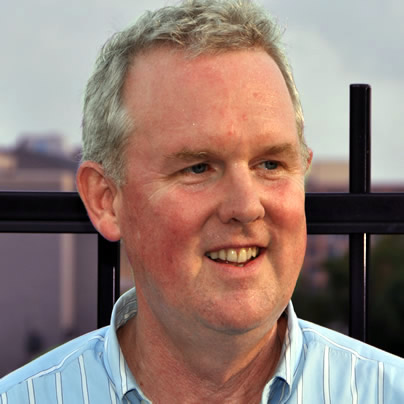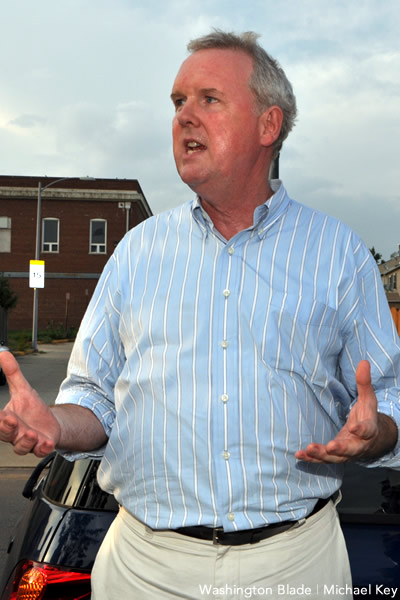Local
D.C. anti-bullying bill clears key vote
Training requirement eliminated to cut cost of measure


‘The bill delivers a strong message that this city will not tolerate bullying – especially for our LGBT youth,’ said Council member Tommy Wells. (Washington Blade photo by Michael Key)
A D.C. Council committee voted unanimously on April 20 to approve the Youth Bullying Prevention Act of 2012 and to send it to the full Council for an expected preliminary vote on May 1.
“The bill delivers a strong message that this city will not tolerate bullying – especially for our LGBT youth – in our schools, libraries, recreation centers and where the city serves its youth,” said Council member Tommy Wells (D-Ward 6).
Wells is chair of the Council’s Committee on Libraries, Parks, Recreation and Planning, which worked with the mayor’s office and LGBT advocates over the past year to make significant revisions to the bill before voting to approve it last week.
With the city facing an expected budget shortfall next year, Wells and his fellow committee members were faced with the need to make changes to lower the cost of implementing the bill.
The revised version of the bill, for example, eliminates a provision in the earlier version that stated, “To the extent that funds are appropriated for these purposes,” various city agencies, including the public school system, “shall provide training on the agency’s harassment, intimidation or bullying policies to employees and volunteers who have significant contact with students or the public…”
The revised bill approved by the committee says the public schools and other city agencies “may … provide training on bullying prevention to all employees and volunteers who have significant contact with youth.”
Alison Gill, public policy manager for the Gay, Lesbian and Straight Education Network, or GLSEN, which worked with Wells’ office to help revise the bill, said the training requirement in the earlier version of the bill was contingent upon the availability of city funds and the elimination of that provision would have a minimal impact on the overall bill.
“I think it’s excellent,” Gill said of the revised bill. “The new bill addresses the issues the community had raised over the past year.”
Among those issues, Gill said, was the need to broaden the definition of bullying from the original bill to include all of the categories of individuals protected under the D.C. Human Rights Act and the need to strengthen the reporting requirements for schools and city agencies to keep track of bullying incidents.
The committee vote came just over one week after Mayor Vincent Gray announced he would put into place a citywide anti-bullying initiative through his executive authority as mayor. His proposal includes the creation of a special task force on bullying and the development of a model anti-bullying policy and standards to be used by city agencies with jurisdiction over youth.
The legislation approved by Wells’ committee, among other things, also calls for creating a bullying task force and developing a comprehensive anti-bullying policy for city agencies.
Gill said the mayor’s task force and bullying polices would be adopted as those required under the bill, with an expected smooth transition once the bill becomes law.
Eleven of the Council’s 13 members signed on as co-introducers or co-sponsors of the earlier version of the bill. Supporters say the new version is expected to pass the full Council by an overwhelming margin.
A summary of the bill’s provisions released by Wells’ office says the measure includes these key components:
• The establishment and implementation of a bullying prevention policy, including reporting and investigation guidelines, that specifically covers all youth, including youth of color, LGBT youth, and youth with disabilities.
• The establishment of an appeal process for a party dissatisfied with the outcome of an initial investigation of a bullying incident.
• A clear prohibition against retaliation against a target of bullying, a witness to a bullying incident, or someone who reports an incident of bullying.
• The granting of legal immunity from lawsuits against an employee, volunteer or youth who “in good faith” reports an incident of bullying.
The bill defines bullying as “any severe, persistent act or conduct, whether physical, electronic, or verbal that … shall be reasonably predicted to place the youth in reasonable fear of physical harm to his or her person or property; cause a substantial detrimental effect on the youth’s physical or mental health; substantially interfere with the youth’s academic performance or attendance; or substantially interfere with the youth’s ability to participate in or benefit from the services, activities, or privileges provided by an agency, educational institution, or grantee.”
It defines “grantee” as an entity or contractor that provides services, activities or privileges to youth on behalf of the city.
Wells said at the time the committee voted to approve the bill that a financial impact statement prepared by the Office of the Chief Financial Officer shows that implementing the measure would cost the public school system $36,000 in fiscal year 2014 and $31,000 in both fiscal years 2015 and 2016.
Wells said public school officials indicated the system “cannot absorb this amount,” requiring that the Council and mayor identify other sources of funding.
Wells’ office said last month that an inability to identify funding sources for the bill was among the reasons it has been stalled in committee for more than a year. The revised bill is believed to be far less costly than the earlier version.
“I am confident we will resolve this issue before the bill has its first reading at the full Council,” Wells said.
The committee members who voted to approve the bill, in addition to Wells, were David Catania (I-At-Large), Phil Mendelson (D-At-Large) and Vincent Orange (D-At-Large).
Maryland
Md. Commission on LGBTQIA+ Affairs released updated student recommendations
LGBTQ students report higher rates of bullying, suicide

The Maryland Commission on LGBTQIA+ Affairs has released updated recommendations on how the state’s schools can support LGBTQ students.
The updated 16-page document outlines eight “actionable recommendations” for Maryland schools, supplemented with data and links to additional resources. The recommendations are:
- Developing and passing a uniform statewide and comprehensive policy aimed at protecting “transgender, nonbinary, and gender expansive students” against discrimination. The recommendation lists minimum requirements for the policy to address: name, pronoun usage, and restroom access.
- Requiring all educators to receive training about the specific needs of LGBTQ students, by trained facilitators. The training’s “core competencies” include instruction on terminology, data, and support for students.
- Implementing LGBTQ-inclusive curricula and preventing book bans. The report highlights a “comprehensive sexual education curriculum” as specifically important in the overall education curriculum. It also states the curriculum will “provide all students with life-saving information about how to protect themselves and others in sexual and romantic situations.”
- Establishing Gender Sexuality Alliances “at all schools and in all grade levels.” This recommendation includes measures on how to adequately establish effective GSAs, such as campaign advertising, and official state resources that outline how to establish and maintain a GSA.
- Providing resources to students’ family members and supporters. This recommendation proposes partnering with local education agencies to provide “culturally responsive, LGBTQIA+ affirming family engagement initiatives.”
- Collecting statewide data on LGBTQ youth. The data on Maryland’s LGBTQ youth population is sparse and non-exhaustive, and this recommendation seeks to collect information to inform policy and programming across the state for LGBTQ youth.
- Hiring a full-time team at the Maryland Department of Education that focuses on LGBTQ student achievement. These employees would have specific duties that include “advising on local and state, and federal policy” as well as developing the LGBTQ curriculum, and organizing the data and family resources.
- Promoting and ensuring awareness of the 2024 guidelines to support LGBTQ students.
The commission has 21 members, with elections every year, and open volunteer positions. It was created in 2021 and amended in 2023 to add more members.
The Governor’s Office of Communication says the commission’s goal is “to serve LGBTQIA+ Marylanders by galvanizing community voices, researching and addressing challenges, and advocating for policies to advance equity and inclusion.”
The commission is tasked with coming up with yearly recommendations. This year’s aim “to ensure that every child can learn in a safe, inclusive, and supportive environment.”
The Human Rights Campaign’s most recent report on LGBTQ youth revealed that 46.1 percent of LGBTQ youth felt unsafe in some school settings. Those numbers are higher for transgender students, with 54.9 percent of them saying they feel unsafe in school.
Maryland’s High School Youth Risk Behavior Survey reveals a disparity in mental health issues and concerns among students who identify as LGBTQ, compared to those who are heterosexual. LGBTQ students report higher rates of bullying, feelings of hopelessness, and suicidal thoughts. Nearly 36 percent of LGBTQ students report they have a suicide plan, and 26.7 percent of respondents say they have attempted to die by suicide.
The commission’s recommendations seek to combat the mental health crisis among the state’s LGBTQ students. They are also a call for local and state governments to work towards implementing them.
Virginia
Va. lawmakers consider partial restoration of Ryan White funds
State Department of Health in 2025 cut $20 million from Part B program

The Virginia General Assembly is considering the partial restoration of HIV funding that the state’s Department of Health cut last year.
The Department of Health in 2025 cut $20 million — or 67 percent of total funding — from the Ryan White Part B program.
The funding cuts started with the Trump-Vance administration passing budget cuts to federal HIV screening and protection programs. Rebate issues between the Virginia Department of Health and the company that provides HIV medications began.
Advocates say the funding cuts have disproportionately impacted lower-income people.
The Ryan White HIV/AIDS Program, a federal program started in 1990, provides medical services, public education, and essential services. Part B offers 21 services, seven of which remained funded after the budget cuts.
Equality Virginia notes “in 2025, a 67 percent reduction severely destabilized HIV services across the commonwealth.”
Virginia lawmakers have approved two bills — House Bill 30 and Senate Bill 30 — that would partially restore the funding. The Ryan White cuts remain a concern among community members.
Both chambers of the General Assembly must review their proposed changes before lawmakers can adopt the bills.
“While these amendments aren’t a full restoration of what community-based organizations lost, this marks a critical step toward stabilizing care for thousands of Virginians living with HIV,” said Equality Virginia Executive Director Narissa Rahaman. “Equality Virginia plans to continue their contact with lawmakers and delegates through the conference and up until the passing of the budget.”
“We appreciate lawmakers from both sides of the aisle who recognized the urgency of this moment and will work to ensure funding remains in the final version signed by the governor,” added Rahaman.
District of Columbia
D.C. Black Pride theme, performers announced at ‘Speakeasy’
Durand Bernarr to headline 2026 programming

The Center for Black Equity held its 2026 DC Black Pride Theme Reveal event at Union Stage on Monday. The evening, a “Speakeasy Happy Hour,” was hosted by Anthony Oakes and featured performances by Lolita Leopard and Keith Angelo. The Center for Black Equity organizes DC Black Pride.
Kenya Hutton, Center for Black Equity president and CEO, spoke following the performances by Leopard and Angelo. Hutton announced this year’s theme for DC Black Pride: “New Black Renaissance.”
Performers for 2026 DC Black Pride were announced to be Bang Garcon, Be Steadwell, Jay Columbus, Bennu Byrd, Rue Pratt and Akeem Woods.
Singer-songwriter Durand Bernarr was announced as the headliner for the 2026 festivities. Bernerr gave brief remarks through a video played on the screen at the stage.
DC Black Pride is scheduled for May 22-25. For more information on DC Black Pride, visit dcblackpride.org.


















